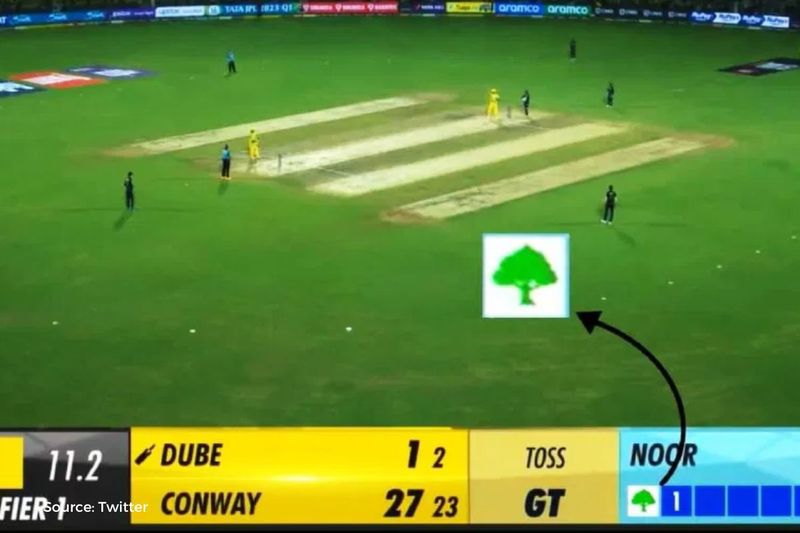
The Tatas will plant 147,000 trees thanks to the 294 dot-balls that were bowled during the four play-off games in IPL 2023.
When most brands sponsor a property or an event, they usually commit most of their budgets for the sponsorship alone, and hardly have much left for activating the sponsorship.
What’s the difference, you may ask?
When a brand enters into a sponsorship agreement, they typically sign a contract to have their brand logo or marketing collateral displayed on banners, hoardings or apparel.
To activate that sponsorship would mean to creatively engage the target audience in a meaningful campaign that enhances the brand’s positioning, relevance, salience and recall.
Case in point: Tata’s “Plant A Tree” activation campaign at the IPL Play-offs this year.
As title sponsors of the tournament, they are investing around US$42M per year to ensure that their brand logos and assets get the requisite awareness on-field and across digital broadcasting channels.
But to activate this sponsorship in a meaningful manner, in partnership with the BCCI, they planned a campaign during the IPL Play-offs to plant a tree for every dot-ball bowled.
Do you recall seeing the dot-ball symbol change to a green tree on your television screen?
That was part of Tata’s brand-activation campaign that was not only a rather unique and creative move, but also something that is in alignment with the brand’s core ethos and purpose.
At this year’s play-offs, across the four matches, a total of 294 dot balls were bowled, and this meant that The Tatas and the BCCI would plant 147,000 trees across India.
In Qualifier 1, 84 dot-balls were bowled when the Chennai Super Kings beat the Gujarat Titans in Chennai. Thus, 42,000 saplings were planted.
In the Eliminator, 96 dot-balls were bowled when the Mumbai Indians beat the Lucknow Super Giants in Chennai, leading to 48,000 new trees being planted.
In Qualifier 2, 68 dot-balls were bowled when the Gujarat Titans beat the Mumbai Indians in Ahmedabad. That resulted in 34,000 new trees being planted.
In the final, 46 dot-balls were bowled when the Chennai Super Kings beat the Gujarat Titans in Ahmedabad, and another 23,000 trees will eventually add to the green cover.
The bowlers primarily responsible for most of the dot-balls in the batsmen-friendly T20 format included Mohammed Shami, Rashid Khan, Matheesha Pathirana and young Akash Madhwal, who not only took a five-for in his 3.2 overs but also ensured that 17 of the 20 balls he delivered were dots!
How meaningful an initiative by the Tata’s, for whom ‘Responsibility’ and ‘Pioneering’ are two of their five core values. This clearly supports that vision and bears testament to their commitment to our nation and the communities they operate in.
One wonders whether the IPL and its various brand sponsors and partners could extend and build on this in the coming season.
Could they offer to plant trees or commit to similar sustainability initiatives based on sixes and fours hit, given that we enjoyed 2,174 fours and 1,124 sixes over the course of the tournament?
Along with the Orange and Purple Caps, should they institute a Green Cap for the player who delivers the most dot-balls, or hits the most four and sixes as part of a tree-planting initiative?
Alongside the Fair Play award, could they institute a Sustainable Team award category incentivising teams to instil sustainable practices and commit to certain Environmental, Social and Governance (ESG) goals?
Should the IPL create a carbon calculator estimating its carbon footprint across the different cities it plays in, and commit to tracking, reducing and offsetting this?
With 16 successful editions under its belt, with each match commanding over a $15M worth of media rights, with games enjoying over 20-30M concurrent viewers on OTT channels, and with the 10 franchises being valued at over a billion dollars each on average, it is time for the IPL to leverage its credibility and voice to create awareness and make a statement about being a force for good.
And for the 150 brands associated with the tournament, wouldn’t it be a wonderful opportunity to activate their brand sponsorships beyond just plastering their logos and creatives, and commit to being stewards of positive and meaningful change?
The Tatas have been trailblazers in numerous domains, including championing our athletes from the early 20th century. Through this “Plant A Tree per Dot Ball” campaign, they have once again set the right precedent for many others to follow.



